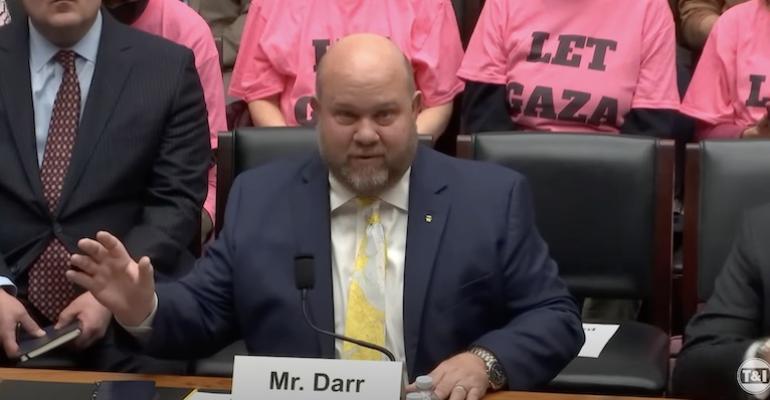While the missiles and drones continue to fly around the Red Sea and the Gulf of Aden, US policy-makers are now working methodically to understand the impacts on the broader economy and thinking about crafting policies to deal with potential disruptions.
This week, the US House of Representatives, Subcommittee on Coast Guard and Maritime Transportation- part of the wider reaching Committee on Transportation and Infrastructure, held a session titled “Menace on the Red Sea: Securing Shipping Against Threats in the Red Sea” The list of witnesses included Bud Darr, who handles “Maritime Policy and Governmental Affairs” at MSC, which he was quick to note is a member of the World Shipping Council, which represents nearly all of the liners with vessels calling at US ports.
In his remarks, Darr noted that initial attacks were aimed at vessels with an Israeli connection, but the situation had now evolved to one where “the Houthi’s targeting has become so attenuated from Israeli interests that it is indiscriminate, placing all commercial vessels transiting the Southern Red Sea and Gulf of Aden in the vicinity of Yemen at risk of being attacked.”
Speaking about MSC’s reaction, which he described as “diverting services that would typically transit the Red Sea and the Suez Canal around the Cape of Good Hope (CGH), until we are confident the security situation is safe enough to have our seafarers return to the Red Sea”. Darr, a veteran of the US Navy and US Coast Guard, asserted that: “The Red Sea security situation has required MSC to re-wire its entire global network.”
A concern in the hearings, which also included testimony from the cargo side- as represented by the National Retail Federation, Darr honed on in the elephant in the room- the potential economic impacts of these “re-wired” shipping patterns across the broader supply chain. Indeed, the pandemic induced disruptions (circa 2021 into early 2022), and disruptions at Panama, were mentioned by the Subcommittee’s Chairperson, Congressman Dan Webster (Republican representing central Florida) noted: “We saw firsthand during the pandemic what a significant supply chain crisis can do to the global economy, and we must not let it happen again.”
In his testimony, Darr pointed to MSC (and presumably other liner carriers) commitments to “serving the international trade of the United States, and our adaptability and resiliency to continue to move maritime commerce for importers and exporters across the world’s oceans despite the current geopolitical challenges.”
Speaking about MSC’s position as the “largest fleet in the world, with some 800 container ships, with a capacity exceeding 4 million teu”, he expressed a view, “that if we can continue to access US ports uninterrupted, we have sufficient assets and capacity for the foreseeable future to ensure US importers and exporters access to global markets.”
Importantly, Darr was quick to distinguish the present logistical snafus from the situation in 2021, with vessels anchored in San Pedro Bay, telling Congressman Webster’s panel: “the present situation is unique and distinct from the situation we faced during the pandemic where the congestion was caused by US land-based logistics being overwhelmed by unprecedented import demand.”
In response to a question from Webster directly regarding “lessons learned” Darr said: “The fundamental problems that we saw particularly in the United States really can be traced back much more to the shoreside component…addressing both the infrastructure and operational practices there can help insulate his for future crisis whether it be this one, or one of a different scale…I would emphasize a focus on fixing that part.”
If you are interested to watch the full committee hearing a video recording is available below
Copyright © 2024. All rights reserved. Seatrade, a trading name of Informa Markets (UK) Limited.
Add Seatrade Maritime News to your Google News feed.  |

